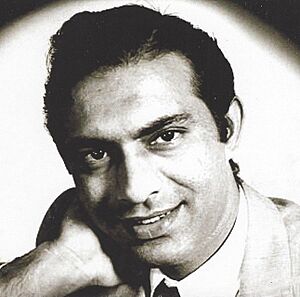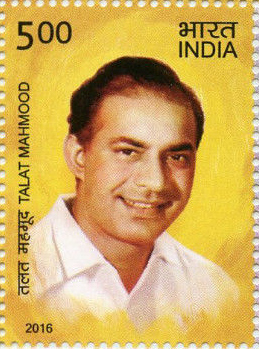Talat Mahmood facts for kids
Quick facts for kids
Talat Mahmood
|
|
|---|---|
 |
|
| Born | 24 February 1924 Lucknow, United Provinces, British India
|
| Died | 9 May 1998 (aged 74) Mumbai, Maharashtra, India
|
| Other names | The King of Ghazals, also Shahenshah-e-Ghazal |
| Occupation |
|
| Years active | 1939–1986 |
| Known for | Bollywood Ghazals, Playback singing |
| Awards | Padma Bhushan Award by the Indian government in 1992 |
Talat Mahmood (born February 24, 1924 – died May 9, 1998) was a famous Indian singer. He was known for singing in movies and for his special style of music called ghazals. Many people consider him one of the best male singers in India.
Talat Mahmood received the Padma Bhushan award in 1992. This award is one of India's highest honors. He got it for his amazing work in film music and ghazal singing.
He was especially famous for his soft, gentle, and slightly trembling voice. He loved to sing romantic and sad songs. Talat Mahmood helped shape how modern ghazals were sung in India during the 1950s and 1960s.
Contents
Early Life and Music
Talat Mahmood was born in Lucknow, India. His father was Manzoor Mahmood. From a very young age, Talat loved music. He would often stay up all night to listen to music concerts.
His family was quite traditional, and singing was not something they encouraged. Talat had to choose between working in films and staying at home. Even though his parents didn't approve, he chose to work in films. It took about ten years for his family to accept his career. This happened after he became well-known in the Indian film industry.
Talat Mahmood's Singing Career
Talat learned classical music from Pandit S.C.R. Bhat. He studied at Marris College of Music in Lucknow in the late 1930s. Talat Mahmood started his singing career when he was 16 years old in 1939. He began singing ghazals by famous poets like Daag and Mir on All India Radio in Lucknow.
His voice was very unique and different from other singers. A music company called HMV quickly noticed him. They offered Talat his first song recording in 1941. It was called Sab din ek samaan nahin tha.
His fame as a ghazal singer grew beyond Lucknow. It reached Calcutta (now Kolkata), which was a big film city back then. In 1944, he sang a very popular song called Tasveer teri dil mera behela nah sake gi. This song made him famous across India. Soon, the Calcutta film industry wanted him to sing for them.
Talat also recorded many Bengali songs in Calcutta. He sometimes used the name "Tapan Kumar" for these songs.
In 1949, Talat moved to Bombay to sing for the Hindi film industry. He got his big break with the song Ae dil mujhay aisi jaga le chal. This song was for the film Arzoo (1950). It was composed by Anil Biswas, who was his guide in Bombay.
His last song in Hindi films was a duet with Lata Mangeshkar in 1971. It was for the film Woh Din Yaad Karo. He also sang in an Urdu movie called Vale-E Azam in 1987.
Acting in Films
Talat Mahmood acted in more than ten films. He worked with famous actresses like Nutan, Mala Sinha, and Suraiya. Later, he decided to stop acting and focus only on singing.
Here are some of the Hindi films he acted in:
| Film Name | Year | Opposite |
|---|---|---|
| Raj Laxmi | 1945 | Kananbala |
| Tum Aur Main | 1947 | Kanandevi |
| Samapti | 1949 | Bharti Devi |
| Aaraam | 1951 | Madhubala, Dev Anand |
| Thokar | 1953 | Shammi Kapoor |
| Dil-e-Nadaan | 1953 | Shyama, Peace Kanwal |
| Daak Babu | 1954 | Nadira |
| Waris | 1954 | Suraiya, Nadira |
| Raftaar | 1955 | Nadira |
| Diwali Ki Raat | 1956 | Roopmala, Shashikala |
| Ek Gaon Ki Kahani | 1957 | Mala Sinha |
| Lala Rukh | 1958 | Shyama |
| Maalik | 1958 | Suraiya |
| Sone Ki Chidiya | 1958 | Nutan |
In the late 1960s, new music styles like rock-n-roll became popular. This meant singers like Talat were not as much in demand. Film producers wanted songs that were more upbeat. Talat's gentle voice was different from the powerful voices of other popular singers like Mohammad Rafi and Mukesh.
Also, India was becoming more prosperous and happy. So, sad ghazals were not as popular anymore. Talat continued to record good songs, but fewer of them. His last recording was in 1985, a duet called "Mere Shareek-e-Safar".
Talat was one of the first Indian singers to perform concerts abroad. In 1956, he toured East Africa, the United States, the UK, and the West Indies. He performed in famous places like Royal Albert Hall in London and Madison Square Garden in the United States. He continued singing until 1991, when he toured the Netherlands.
Family Life
Talat married Latika Mullick, a Bengali Christian girl from Calcutta, on February 20, 1951. She was also an actress and a big fan of his. She later changed her name to Nasreen. They had two children: Khalid, born in 1953, and Sabina, born in 1959.
His grand-niece, Sahar Zaman, is a well-known journalist. She created a special event called Jashn-e-Talat to honor his career. To celebrate his 100th birthday in 2024, Sahar wrote a book about him called 'Talat Mahmood The Definitive Biography'.
Personality and Character
People who knew Talat Mahmood described him as a quiet person. Many said he was a very decent man. His smooth and gentle voice reflected his calm and kind nature. Music directors who worked with him felt that listening to him sing showed he had a soft heart.
The famous actor Dilip Kumar called Talat "a perfect gentleman." Another well-known Indian film music director, Mohammed Zahur Khayyam, said, "He was a perfect gentleman. With him there was no loose talk. He was always well-dressed: his shoes shining and his trousers perfectly creased."
His Music Collection
Talat Mahmood sang about 750 songs in 12 different languages. His career lasted over 40 years, from the 1940s to the 1980s. He recorded his first song in 1941.
Popular Songs
Here are some of his most memorable songs from Indian films:
| Song | Film | Year | Notes |
|---|---|---|---|
| Humse Aaya Na Gaya | Dekh Kabira Roya | 1957 | |
| Aa Chan Ve | Mutiar, Punjabi movie | 1951 | With Surinder Kaur |
| Jatta aayi basakhi faslan di mukk gayi raakhi | Koday Shah, Punjabi movie | 1953 | Chorus with Shaminderpal Singh, Meena Mangeshkar |
| Jayen To Jayen Kahan | Taxi Driver | 1954 | |
| Tasveer Banata Hoon | Baradari | 1955 | |
| Dil-E-Nadaan Tujhe Hua Kya Hai | Mirza Ghalib | 1954 | Duet song with Suraiya |
| Itna Na Mujhse Tu Pyar Badha | Chhaya | 1961 | Duet song with Lata Mangeshkar |
| Seene Mein Sulagte Hai Armaan | Tarana | 1951 | Duet song with Lata Mangeshkar |
| Aansoo Samajhke Kyon Mujhe | Chhaya | 1961 | |
| Aaha Rimjhim Ke Yeh Pyare Pyare Geet Liye | Usne Kaha Tha | 1960 | Duet song with Lata Mangeshkar |
| Sham-E-Gham Ki Kasam | Footpath | 1953 | |
| Jalte Hain Jiske Liye | Sujata | 1959 | |
| Meri Yaad Mein Tum Na Aansoo Bahana | Madhosh | 1951 | |
| Phir Wahi Sham, Wahi Gham | Jahan Ara | 1964 | |
| Ae Mere Dil Kahin Aur Chal | Daag | 1952 | |
| Zindagi Denewale Sun | Dil-e-Nadaan | 1953 | |
| Main Dil Hoon Ek Armaanbhara | Anhonee | 1952 | |
| Andhe Jahan Ke Andhe Raste | Patita | 1953 | |
| Kadale Neela Kadale | Dweep | Music By M.S.Baburaj, Malayalam film | |
| "Lal Lal Hothwa Se" | Laagi Nahi Chhute Ram | 1963 | Bhojpuri Film |
| "Lagi Nahi Choote Ram" | |||
| Ashqon Ne Jo Paya Hai | Chaandi Ki Deewar | 1964 | Music: N Dutta; Lyricist: Sahir Ludhianvi |
| Bechain Nazar, Betaab Jigar | Yasmeen | 1955 | |
| Raat Ne Kya Kya Khwab Dikhaye | Ek Gaon Ki Kahani | 1957 | |
| Chal Diya Karvaan, Loot Gaye Hum Yahan | Laila Majnu | ||
| Hoke Majboor Mujhe Usne Bulaya Hoga | Haqeeqat | 1964 | Song with Mohammed Rafi, Manna Dey & Bhupinder Singh |
| Aye Dil Mujhe Aisi Jaga Le Chal | Arzoo | 1950 | |
| Milte Hi Aankhen Dil Hua Deewana | Babul | 1950 | |
| Mera Jeevan Saathi Bichhar Gaya | Babul | 1950 | |
| Koi Nahin Mera Is Duniya Mein | Daag | 1952 | |
| Hum Dard Ke Maron Ka | Daag | 1952 | |
| Mohabbat Ki Kahaniyan | Woh Din Yaad Karo | 1971 | Melodious duet song with Lata Mangeshkar composed by Great music duo Laxmikant-Pyarelal |
In 1960, Talat visited Dhaka and sang two beautiful Bengali songs for the film Rajdhanir Buke.
| Song | Film | Year | Notes |
|---|---|---|---|
| Tomare legechche etoje bhalo | Rajdhanir Bukey | 1960 | Lyrics: KG Mostafa |
| Amaar se gaan furiye gechhe | Rajdhanir Bukey | 1960 |
Legacy and Tributes
Talat Mahmood passed away on May 9, 1998.
In 2016, India Post released a special postage stamp to honor him.
In 2018, an event called Jashn-e-Talat was held in New Delhi. This event paid tribute to Talat Mahmood on the 20th anniversary of his death. His grand-niece, Sahar Zaman, organizes this ongoing tribute festival.
 | James B. Knighten |
 | Azellia White |
 | Willa Brown |


